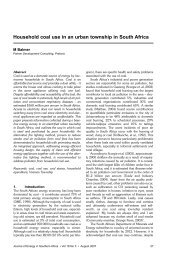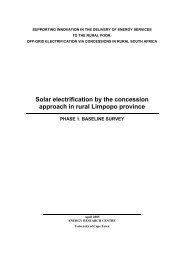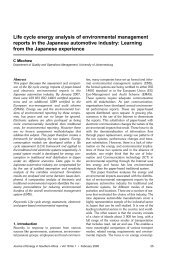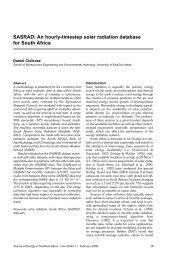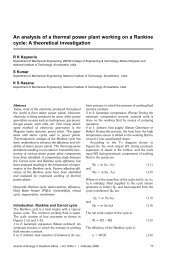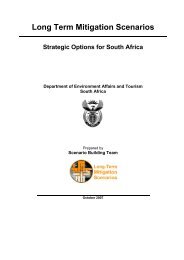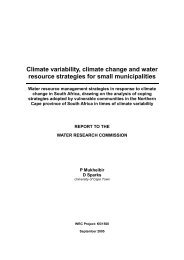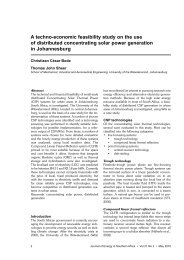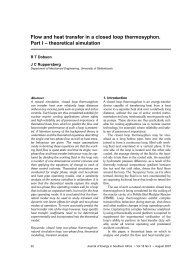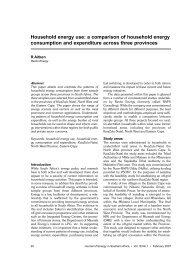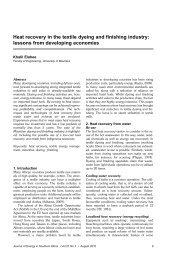(Ed) 2006. Energy policies for sustainable development in South Africa
(Ed) 2006. Energy policies for sustainable development in South Africa
(Ed) 2006. Energy policies for sustainable development in South Africa
Create successful ePaper yourself
Turn your PDF publications into a flip-book with our unique Google optimized e-Paper software.
18 ENERGY POLICIES FOR SUSTAINABLE DEVELOPMENT IN SOUTH AFRICA<br />
2.3.5.1 Real costs and externality costs<br />
An externality cost can be def<strong>in</strong>ed as the change <strong>in</strong> utility or welfare of an agent when<br />
brought about by another, when this change <strong>in</strong> welfare is not compensated <strong>for</strong>, or<br />
appropriated (Van Horen 1996) by the second agent. When we add externality costs to the<br />
supply cost of energy, we get the real cost of this energy to society. Externality costs,<br />
whether positive or negative, give us a basis <strong>for</strong> penalis<strong>in</strong>g or reimburs<strong>in</strong>g energy users <strong>for</strong><br />
their impact on the environment or society. Due to the somewhat subjective nature of<br />
evaluat<strong>in</strong>g actual or potential impact costs, methodologies used <strong>for</strong> externality derivation<br />
must be transparent and related to the context of economic growth <strong>in</strong> the short, medium<br />
and longer terms. Externality data, if derived correctly, can provide important elements <strong>for</strong><br />
construct<strong>in</strong>g an optimised energy system.<br />
In<strong>for</strong>mation dissem<strong>in</strong>ation is vital <strong>for</strong> the establishment of a national, <strong>susta<strong>in</strong>able</strong> energy<br />
system, and the most effective driver <strong>for</strong> the system should be the free market. However,<br />
this is only possible if those <strong>in</strong>volved can base their decisions on clear authoritative data.<br />
For example, it is often said that energy sav<strong>in</strong>gs are possible <strong>for</strong> <strong>South</strong> <strong>Africa</strong>n <strong>in</strong>dustry and<br />
commerce with significant medium-term f<strong>in</strong>ancial ga<strong>in</strong>s. Such options are not be<strong>in</strong>g<br />
pursued primarily because of a lack of accessible authoritative data.<br />
The lower the real cost of energy, the more competitive the economy becomes – an<br />
essential prerequisite <strong>for</strong> economic growth. This is why energy efficiency <strong>in</strong><strong>for</strong>mation and<br />
externality costs, <strong>in</strong>clud<strong>in</strong>g the potential impacts of CO 2 emissions restrictions on<br />
production, must be made known. Mean<strong>in</strong>gful databases should be built up <strong>for</strong> fuel use <strong>for</strong><br />
all energy cycles, from generation to efficient demand-side consumption, and this<br />
<strong>in</strong><strong>for</strong>mation should be made accessible. It should <strong>in</strong>clude, <strong>for</strong> example, all feasible options<br />
<strong>for</strong> rural electrification and energy supply. Such <strong>in</strong><strong>for</strong>mation would encourage optimal<br />
energy <strong>development</strong> and <strong>for</strong>m the basis <strong>for</strong> sound policy. With the right <strong>in</strong><strong>for</strong>mation and<br />
market <strong>for</strong>ces, <strong>South</strong> <strong>Africa</strong>’s energy system will evolve.<br />
In the short term, government encouragement of a <strong>susta<strong>in</strong>able</strong> energy <strong>development</strong> is<br />
essential, with a clear analysis of the most socially economic <strong>development</strong> paths. Possible<br />
means of encourag<strong>in</strong>g <strong>in</strong>tegrated energy plann<strong>in</strong>g <strong>in</strong>clude:<br />
• physical controls such as short-term supply ration<strong>in</strong>g;<br />
• <strong>in</strong>vestment <strong>policies</strong>;<br />
• education <strong>policies</strong>;<br />
• taxes or subsidies;<br />
• market controls such as regulat<strong>in</strong>g residential coal prices;<br />
• establish<strong>in</strong>g energy efficiency agencies.<br />
In implement<strong>in</strong>g regulation, careful consideration must be given to ensur<strong>in</strong>g that externality<br />
costs are borne by the parties responsible, and that controls do not restrict free market<br />
activity (Spald<strong>in</strong>g-Fecher & Matibe 2003). Control measures should be seen as temporary<br />
and, <strong>in</strong> time, dim<strong>in</strong>ish. In the case of externalities, as the parties affected become<br />
empowered, a laissez-faire situation would ideally evolve – so that, <strong>for</strong> example, a polluter<br />
and the parties affected by the pollution would barga<strong>in</strong> to establish an optimum pollution<br />
level and an associated cost compensation. Thus energy supplied will be at the lowest real<br />
cost to society.<br />
2.4 Outlook <strong>for</strong> the future – technologies and <strong>policies</strong><br />
The <strong>South</strong> <strong>Africa</strong>n energy sector faces a twofold challenge – to address the unacceptable<br />
lot of the poor, and to employ technologies and practices that will provide <strong>in</strong>expensive<br />
energy <strong>for</strong> a competitive economy without stra<strong>in</strong><strong>in</strong>g resources of the national, regional and



